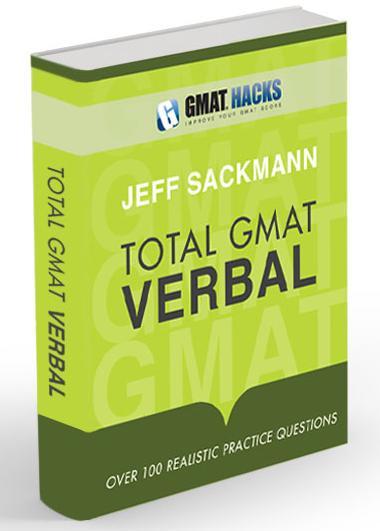
Bookshelf
|
|
Total GMAT Math Jeff's complete Quant guide, on sale now! |
|
|
Total GMAT Verbal Everything you need to ace GMAT Verbal! |
1,800 Practice Math Questions
Buy Jeff's books at Amazon.com

GMAT Official Guide, with IR
OG Math | OG Verbal
OG12 & Quant Rev solutions!
GMAT Question of the Day
Beginner's Guide to the GMAT
GMAT Hacks Affiliate Program

Recent Hacks

Categories
- General Study Tips
- Goals and Planning
- CAT Strategy
- The Mental Game
- GMAT Math Strategy
- GMAT Math Topics
- Mental Math
- Data Sufficiency
- Critical Reasoning
- Reading Comprehension
- Sentence Correction
- Analytical Writing Assessment
- Integrated Reasoning
- IR Explained
- Business School Admissions
- GMAT Prep Resources
- Practice Questions
- Total GMAT Math
- Total GMAT Verbal
- GMAT 111

Failure and Routine
| You should follow me on Twitter. While you're at it, take a moment to subscribe to GMAT Hacks via RSS or Email. |
Watching professional tennis players compete at Wimbledon last week, I was struck by how much each player followed a strict routine. More properly: Every professional has a set of multiple routines, governing what they do when they step on the court, how they spend breaks, and how they prepare for each individual point.
One major advantage of such patterns is that they reduce anxiety. Playing a tennis match with such high stakes--thousands of dollars, endorsement deals, ranking points--is going to be stressful. Focusing on routines is one way of thinking about something other than what generates the stress.
The other thing that makes routine so important for a tennis player is that, in a competitive tennis match, both players are constantly losing. Sure, one will win, and that one might even dominate the match. But even in a lopsided contest, the winning player will win dozens of points and a handful of games. In a long, close match, both players might lose nearly 200 points each.
In any activity, it doesn't help to think about recent failures. Better to think about what you can do to succeed in the immediate future. A tennis player who follows a strict routine between points is effectively clearing their mind of the recent past and refocusing on the next challenge.
GMAT Applications
One way the GMAT is similar to a competitive tennis match is that you will, during the course of the test, experience failure. You can get a 700 GMAT score despite missing 20 or more questions--that's one-quarter of the test. You don't get immediate feedback, but I can all but guarantee you that you'll encounter questions that you can't answer confidently.
Further, many test-takers allow those mini-failures to bother them. I can't tell you how many times I've talked to a student after a test, and he or she remembers just one or two questions--the tough ones that they struggled with early in the exam. If someone can repeat an entire math question that long after they saw it (for only a couple of minutes!), odds are they were never able to fully move on.
Because you can only take so many practice tests (I don't recommend spending the time to take many) and you probably won't sit for the exam more than two or three times, if that, it's tough to develop the sort of routine that professional athletes rely on. But that doesn't mean you shouldn't try.
GMAT Routines
One easy way to build a routine into your testing strategy, especially on the Verbal section, is to start your scratchwork on each question the same way. I always turn away from the screen and write down "A B C D E" on my scratch paper. I've written more about this strategy elsewhere.
Another way is to constantly remind yourself how little each question matters. Whether we're talking about question #1, #2, #20, or #35, you can survive a mistake. In fact, you can do just fine even if you make a few mistakes in a row. The GMAT's adaptive algorithm will eventually give you questions you can't answer correctly. Expect to fail occasionally, and don't let those failures bother you on the questions you can answer.
It's also crucial that you master the basics. I'm always surprised when I meet with someone who tells me they have been studying for weeks, but struggles with some simple task. You should be able to factor a quadratic, calculate a weighted average, or outline a Reading Comprehension passage in your sleep. If it's automatic, it's a lot less stressful. One key to reducing test anxiety is overpreparation.
Most important isn't any specific routine, it's that you have some routine and you follow them consistently. When you practice out of a book, do scratchwork the way you plan on doing it during your exam. Make your practice sessions as test-like (quiet and uninterrupted) as possible. Think about how you can make as many aspects of the test automatic as possible, and you'll have that much less to worry about on test day.
About the author: Jeff Sackmann has written many GMAT preparation books, including the popular Total GMAT Math, Total GMAT Verbal, and GMAT 111. He has also created explanations for problems in The Official Guide, as well as 1,800 practice GMAT math questions.
 |
Total GMAT Verbal
The comprehensive guide to the GMAT Verbal section. Recognize, dissect, and master every question type
you'll face on the test. Everything you need, all in one place, including 100+ realistic practice questions. |